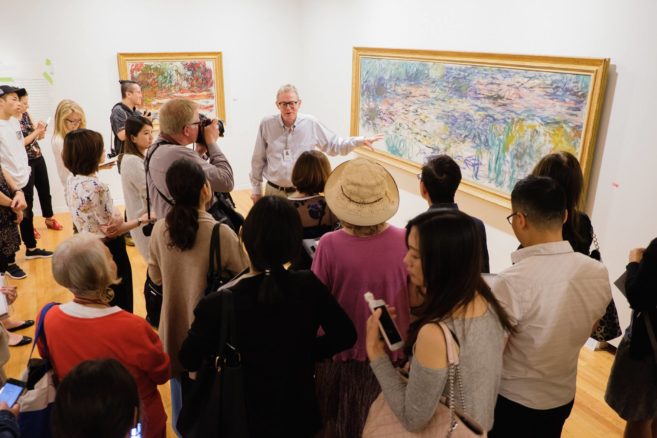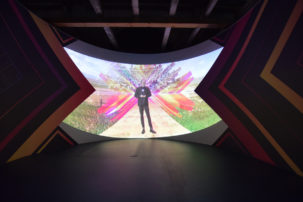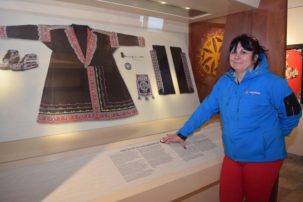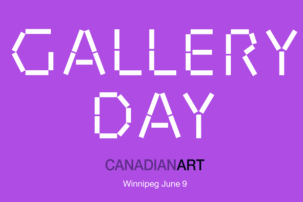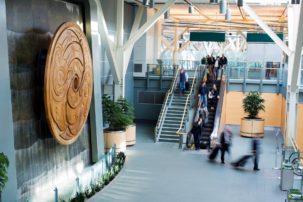The line between art and life got a little too permeable last night for Toronto-based photographer Sarah Palmer.
Over the past months, in addition to working as a contributing photo editor at Maclean’s, Palmer has been heading south to visit Trump rallies and shoot multiple-exposure photographs there. Last night, at the end of US Election Day, she installed images from her series Drunk on Trump at Toronto’s Gladstone Hotel, thinking that it would be the “wrap up” for the project.
“It has a more sour tone now,” Palmer says today of photo display at the Gladstone. “From what I experienced, I heard hateful things throughout all of these rallies. That’s the scary part, I think, that we are just going to revert 50 years.”
This morning, Canadian Art editors reached out to others who have seen the US election unfold up close—namely, some of the many Canadian artists and arts workers who are based, or partly based, in the United States. We asked them what their initial reactions and preliminary thoughts were to the election results.
Here are some of their thoughts, condensed:
KEN LUM, artist and professor at the University of Pennsylvania School of Design: It’s surprising, but I’m not shocked. I remember very well the Supreme Court decision in Gore vs. Bush, and I remember that was shocking to me in terms of democracy being up to all kinds of manipulation. I was actually more shocked on that one.
I guess I’m also not entirely surprised because if you start going around outside of where I am in Pennsylvania, only an hour and a half east into Lancaster County, you see, “Wow, there’s a lot of Trump signs.” And that’s only the edge of the periphery around Philadelphia.
I don’t think people should feel paralyzed, though. I think it’s a call to action. I have a couple of colleagues here expressing their despondency over the results, and I’m like, we should have a discussion of what a faculty of fine arts should do in terms of responding to this.
The only email I sent was to my students. Basically, it was: I know you guys are tracking stuff, but don’t be inured to political action, or to participating in the political process after this. And also: Don’t just assume that you know everyone who voted for the candidate you didn’t want are idiots. Don’t assume that. I mean, there is a deep sense of real estrangement. Certainly, there is credibility in terms of some of the reasons for feeling anguish, let’s put it that way. I think the tendency is to not acknowledge that, and just say, “They’ve been watching too much Fox News.” But that is a shorthand.
I think Canadians should also soul-search, by the way. There is anguish in Canada, too. I mean, I said to my wife this morning, I’m glad we have Canadian passports. But it’s a challenge for Canadians to ensure that democracy is a continued work in progress that keeps getting better and more inclusive.
CHLOE WISE, artist: I’m completely devastated by this news. The constant hateful rhetoric towards women, LGBTQ communities and people of colour, the Islamophobia, the bigotry. This cannot be an accepted form of speech from a figurehead. As a dual citizen, it feels dark and divisive to be witnessing such vastly different schools of political thought in two countries that are literally one hour away from each other. I’m scared. I feel that everyone I know is currently in a shared state of despondency, having seen America blatantly show its true misogynistic, white-supremacist self. Can’t stop crying. Thankful for my Canadian passport right now 🙁
BRENDAN FERNANDES, artist: I am numb, searching out what I am feeling—enraged? Perhaps angry? Something is burning underneath. I know that as an artist I can use this to create. As an immigrant, a queer, a person of colour and a feminist, I will raise a deeper, more powerful, more important voice to reflect my issues and defend the right to be different. It is my responsibility as an artist to voice what I believe in, and reflect what my communities are going through. Our struggle is important. Our cultural value is important. Our civil rights are important. We will gather in critical mass, make our voices heard again and stop this disrespect. We will not be silenced. We will go into action.
SOJOURNER TRUTH PARSONS, artist: I feel deep sadness and pain around Trump winning this election. I stand in solidarity with the whole beautiful part of humanity that he is trying to sterilize and destroy. Yesterday I met with a curator that was telling me her child is worried about drinking water going away, and another child worried that there won’t be any hugs left in the world. I think and have always believed a more heart-centred existence is necessary for Mother Earth to persevere and that emotional currency is a radical act. My love and respect is going out to everyone who is brutalized by this outcome.
ELISE RASMUSSEN, artist: I’m just shocked and just completely devastated. I had no preparation for this to happen—it’s utterly devastating on so many levels at this point. The whole campaign felt like it was going on for so long, and so filled with hate, and I was just so looking forward to it being over, but now I feel that the worst possible thing has happened. I have lived in the US about 11 years now, and I wonder what I am doing living in a country that doesn’t represent my values? Or feels like it doesn’t appreciate me?
The results really force me to consider the fact that I live in a bubble. I live in NYC, I am in the arts, and I don’t know anyone in my life who shares Trump’s values. Thinking about our roles as artists, I wonder if we’re failing, because we need to educate or reach outside our own circle. We like to think we’re doing important work, but I don’t know if it really makes a difference. There needs to be some serious discussion of what can be done, because I don’t know what the fallout is going to be. I don’t know how far this is going to step back any progress that has been made, and even the progress that has been made has gone at a slower place than it should be at this point in time.
MARIA HUPFIELD, artist: I am bracing myself for the uncertainty that lays ahead not only here in NY but also globally with the recent international turn to the right. There is going to be a lot of work to do and I am overwhelmed by the response and amount of support already taking place across the arts communities I work with here in Brooklyn. No stranger to adversity, my first thoughts are to the future of our people on the front lines at Standing Rock.
SHEILAH WILSON, artist: This morning, my daughter Rose came upstairs from her bed, and asked, “Who won?” And then when she found out, her response was, “Oh no, why?”
And to try to explain I have to go through my own responses which are shock, fear, disbelief…so many of us are trying to make sense of it now, but perhaps we should not allow sense to be made.
We may not deserve to create sense, especially after having developed a certain complacency, based on the media and poll results, that Hillary would surely win. And now to realize that this complacency was hiding something larger and uglier than any of us had realized. That it is not a joke, that a buffoon can harness the resentment of so many who are desperate to have someone who can put a voice on their fears…. That somehow he reached a population of the country that feels unheard.
There are so many who will be living in greater fear this morning—African-American, Muslim, Mexican, Jewish, Immigrant, Queer…any minority will be afraid for what happens next. I am.
No sense should be made yet. We should struggle and we should examine ourselves and what we are going to do to change. What am I going to fight for? What am I going to do so that my daughter learns what it is to fight against xenophobia, homophobia, misogyny and racism? These are the things I am asking myself today.
ADRIANNE RUBENSTEIN, artist: Somehow I find myself rushing to a meeting right now as if it’s a normal day. The feeling in New York is very bleak, people are walking around in tears, I am getting a lot of texts from people saying “I love you” and it’s cloudy and drizzling, too.
I spent the morning looking up jobs on the OCAD website. I feel very torn about what to do and distraught about what this all means. Like I was living in a bubble coasting along and that period is over now. I am very much in solidarity with American people who share Canadian values. I am afraid this will be devastating for the economy around art, but also accepting that there are more important things. Basically I am miserable and very depressed. We need unity with Canada now more than ever.
RYAN SLUGGETT, artist: I am reeling, and I am ashamed. I am ashamed at how little progressive change white culture has been able to absorb in an overwhelmingly racist, misogynist America. This election result is a horrifying whitelash: the US has been jolted from the first African American President to a President supported by the Klu Klux Klan.
I live in a largely black neighbourhood and as a white male I will be ashamed to look into the eyes of my fellow neighbours this morning. But I will join in any way I can to challenge the unacceptable ideology of Trump. Young people need to contribute to progressive culture to make sure this regressive movement is exposed for all its lies and immorality. Apparently this is going to take endurance, patience and a lot of energy.
DANIELLE FOREST, Marian Goodman Gallery: It’s obviously been an emotional election, but I was surprised that I actually spent my early morning tear-filled. I was angry at first at anyone who put in a protest vote (with such slim margins in certain states ending up for Trump) and I was irrationally rage-filled at the New York Times for their overly confident projections that I think probably immobilized people (all of this useless, silly blame).
Then I felt panicked about how almost every CDN I know is dependent on NAFTA to work here, and I started googling how long it takes to actually dismantle government policies/structures. But most of all, I was really just so, so sad. My heart broke hearing the reactions of friends with children that have to explain the systemic sexism, racism and classism that exist, where hate and fear have taken over love and community.
JULIA LUM, doctoral candidate, history of art, Yale University, and fellow, Getty Research Institute (2016–2017): As a resident alien and a student of art history, my situation in this country is one of both precarity and privilege. Since I do not have the right to participate in the political system, I feel extreme gratitude towards my American friends who turned out yesterday in the hopes of protecting the interests of both citizens and non-citizens in this place. Many of them know full well the impact this election will have on both global politics and on our collective livelihoods as culture workers.
I remember in the Bush years it was easy for some Canadians to point glibly towards the problems to the south, but as we’ve learned Canada will be implicated in many ways, not least of all in those extra-territorial actions that cross our porous borders—pipelines, tradelines, airspaces and ocean waters. Art must find new ways to adapt to these conditions.
I feel a pallor of grief hanging over Los Angeles, home to many migrant and undocumented workers, their families and loved ones. I am remembering to be thankful for where I am right now, and hopeful that we—all of us—can come together to protect the rights of humanity, rather than choosing to dig in and retreat towards nationalist rhetorics.
SHELLY BAHL, artist: As an artist, a woman of colour and an immigrant/alien resident of the USA, I am feeling extremely vulnerable. I am questioning my place in the world and where do I call home. Some friends were encouraging me to pursue American citizenship and I have always been reluctant.
As a Canadian artist, New York has always felt like a second home, but I do not feel the same connection to the greater USA. It is a strange land and I truly feel like a stranger today. I am not wanted here but I have a young daughter who is an American. I cannot conceive that I have given birth to an American. She is my blood but her nationality is completely alien to me. I want to bring her home to me but I can no longer articulate that home. India. Canada. USA. I feel truly in-between but not on any solid ground.
SARA CWYNAR, artist: I still don’t know what to say but I was moved by something Toni Morrison said, that this is “precisely the time when artists go to work. There is no time for despair, no place for self-pity, no need for silence, no room for fear. We speak, we write, we do language. That is how civilizations heal.”
I had been thinking about this idea a lot before Tuesday even, what it means to do your work at a time when it feels futile or small. That it can still be very important, something you can do, or one way in through the side when official policy has failed us.

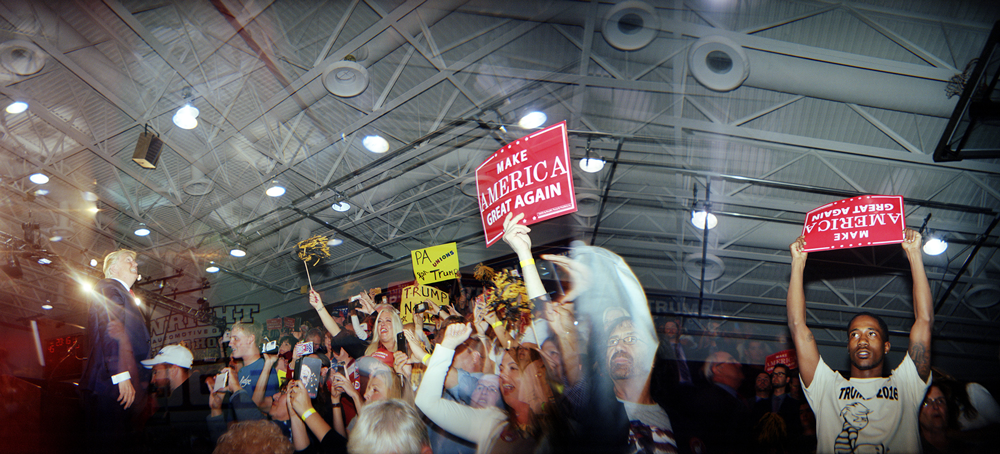 An image from Sarah Palmer's series Drunk on Trump.
An image from Sarah Palmer's series Drunk on Trump.
